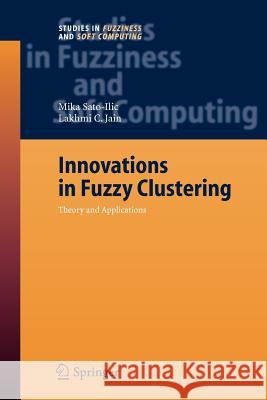Innovations in Fuzzy Clustering: Theory and Applications » książka
Innovations in Fuzzy Clustering: Theory and Applications
ISBN-13: 9783642070723 / Angielski / Miękka / 2010 / 151 str.
Clustering has been around for many decades and located itself in a uniquepositionasafundamentalconceptualandalgorithmiclandmark of data analysis. Almost since the very inception of fuzzy sets, the role and potential of these information granules in revealing and describing structureindatawasfullyacknowledgedandappreciated.Asamatter of fact, with the rapid growth of volumes of digital information, the role of clustering becomes even more visible and critical. Furthermore given the anticipated human centricity of the majority of artifacts of digitaleraandacontinuousbuildupofmountainsofdata, onebecomes fully cognizant of the growing role and an enormous potential of fuzzy sets and granular computing in the design of intelligent systems. In therecentyearsclusteringhasundergoneasubstantialmetamorphosis. Frombeinganexclusivelydata drivenpursuit, ithastransformeditself into a vehicle whose data centricity has been substantially augmented by the incorporation of domain knowledge thus giving rise to the next generation of knowledge-oriented and collaborative clustering. Interestingly enough, fuzzy clustering exhibits a dominant role in many developments of the technology of fuzzy sets including fuzzy modeling, fuzzy control, data mining, pattern recognition, and image processing. When browsing through numerous papers on fuzzy m- eling we can witness an important trend of a substantial reliance on fuzzy clustering being regarded as the general development tool. The same central position of fuzzy clustering becomes visible in pattern classi?ers and neurofuzzy systems. All in all, it becomes evident that further progress in fuzzy clustering is of vital relevance and bene't to the overall progress of the area of fuzzy sets and their application











